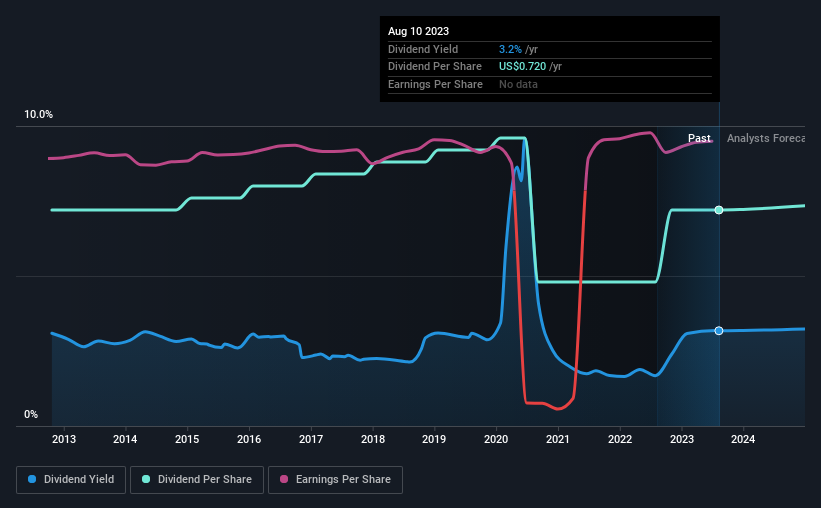Here's What We Like About Berkshire Hills Bancorp's (NYSE:BHLB) Upcoming Dividend
Berkshire Hills Bancorp, Inc. (NYSE:BHLB) is about to trade ex-dividend in the next 4 days. Typically, the ex-dividend date is one business day before the record date which is the date on which a company determines the shareholders eligible to receive a dividend. The ex-dividend date is an important date to be aware of as any purchase of the stock made on or after this date might mean a late settlement that doesn't show on the record date. Thus, you can purchase Berkshire Hills Bancorp's shares before the 16th of August in order to receive the dividend, which the company will pay on the 31st of August.
The company's upcoming dividend is US$0.18 a share, following on from the last 12 months, when the company distributed a total of US$0.72 per share to shareholders. Based on the last year's worth of payments, Berkshire Hills Bancorp stock has a trailing yield of around 3.2% on the current share price of $22.68. Dividends are an important source of income to many shareholders, but the health of the business is crucial to maintaining those dividends. As a result, readers should always check whether Berkshire Hills Bancorp has been able to grow its dividends, or if the dividend might be cut.
Check out our latest analysis for Berkshire Hills Bancorp
Dividends are typically paid out of company income, so if a company pays out more than it earned, its dividend is usually at a higher risk of being cut. Berkshire Hills Bancorp paid out a comfortable 29% of its profit last year.
When a company paid out less in dividends than it earned in profit, this generally suggests its dividend is affordable. The lower the % of its profit that it pays out, the greater the margin of safety for the dividend if the business enters a downturn.
Click here to see the company's payout ratio, plus analyst estimates of its future dividends.
Have Earnings And Dividends Been Growing?
Stocks in companies that generate sustainable earnings growth often make the best dividend prospects, as it is easier to lift the dividend when earnings are rising. If business enters a downturn and the dividend is cut, the company could see its value fall precipitously. For this reason, we're glad to see Berkshire Hills Bancorp's earnings per share have risen 13% per annum over the last five years.
Another key way to measure a company's dividend prospects is by measuring its historical rate of dividend growth. It looks like the Berkshire Hills Bancorp dividends are largely the same as they were 10 years ago.
The Bottom Line
Has Berkshire Hills Bancorp got what it takes to maintain its dividend payments? Typically, companies that are growing rapidly and paying out a low fraction of earnings are keeping the profits for reinvestment in the business. This is one of the most attractive investment combinations under this analysis, as it can create substantial value for investors over the long run. In summary, Berkshire Hills Bancorp appears to have some promise as a dividend stock, and we'd suggest taking a closer look at it.
With that in mind, a critical part of thorough stock research is being aware of any risks that stock currently faces. Be aware that Berkshire Hills Bancorp is showing 2 warning signs in our investment analysis, and 1 of those can't be ignored...
Generally, we wouldn't recommend just buying the first dividend stock you see. Here's a curated list of interesting stocks that are strong dividend payers.
Have feedback on this article? Concerned about the content? Get in touch with us directly. Alternatively, email editorial-team (at) simplywallst.com.
This article by Simply Wall St is general in nature. We provide commentary based on historical data and analyst forecasts only using an unbiased methodology and our articles are not intended to be financial advice. It does not constitute a recommendation to buy or sell any stock, and does not take account of your objectives, or your financial situation. We aim to bring you long-term focused analysis driven by fundamental data. Note that our analysis may not factor in the latest price-sensitive company announcements or qualitative material. Simply Wall St has no position in any stocks mentioned.

